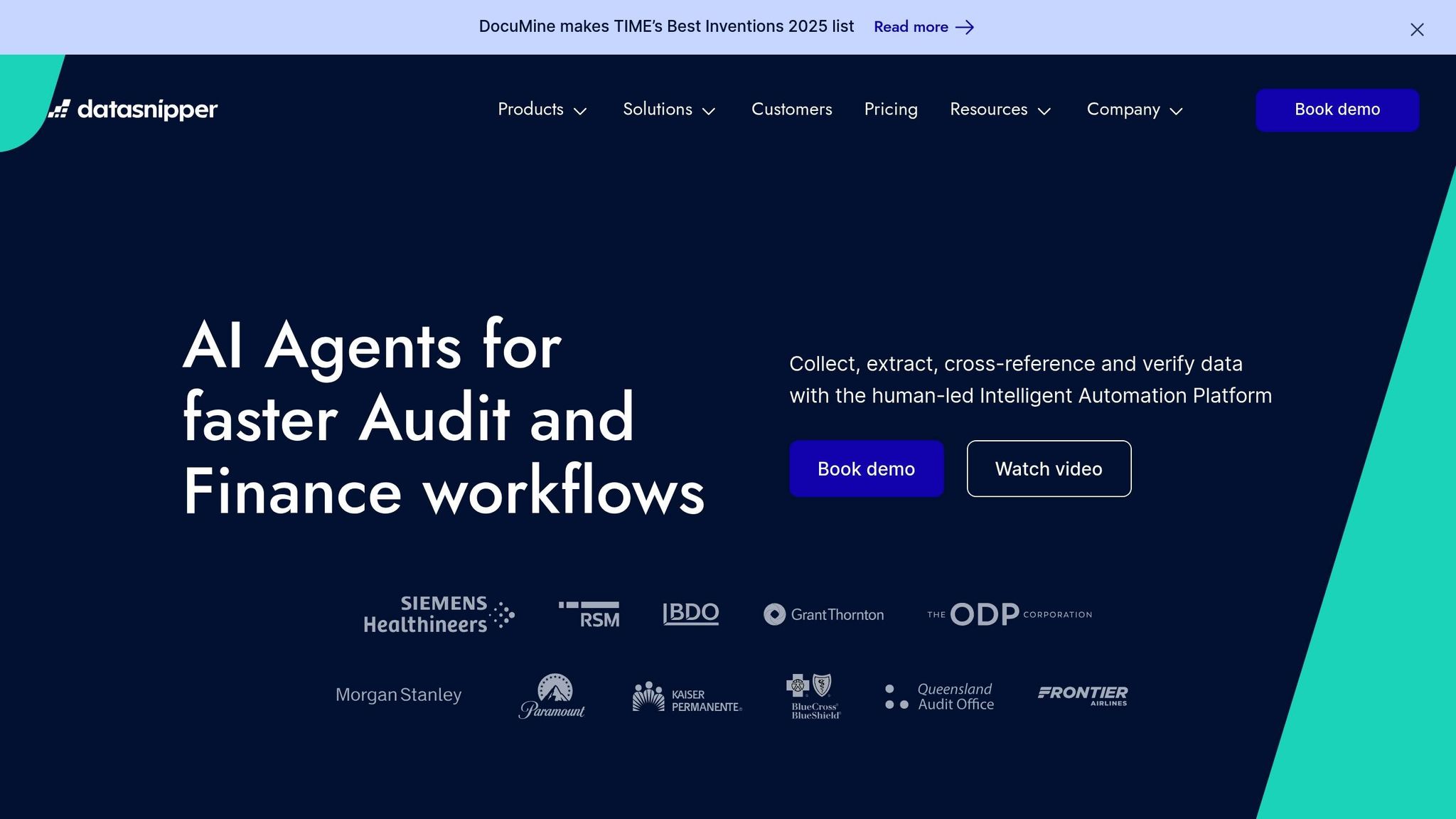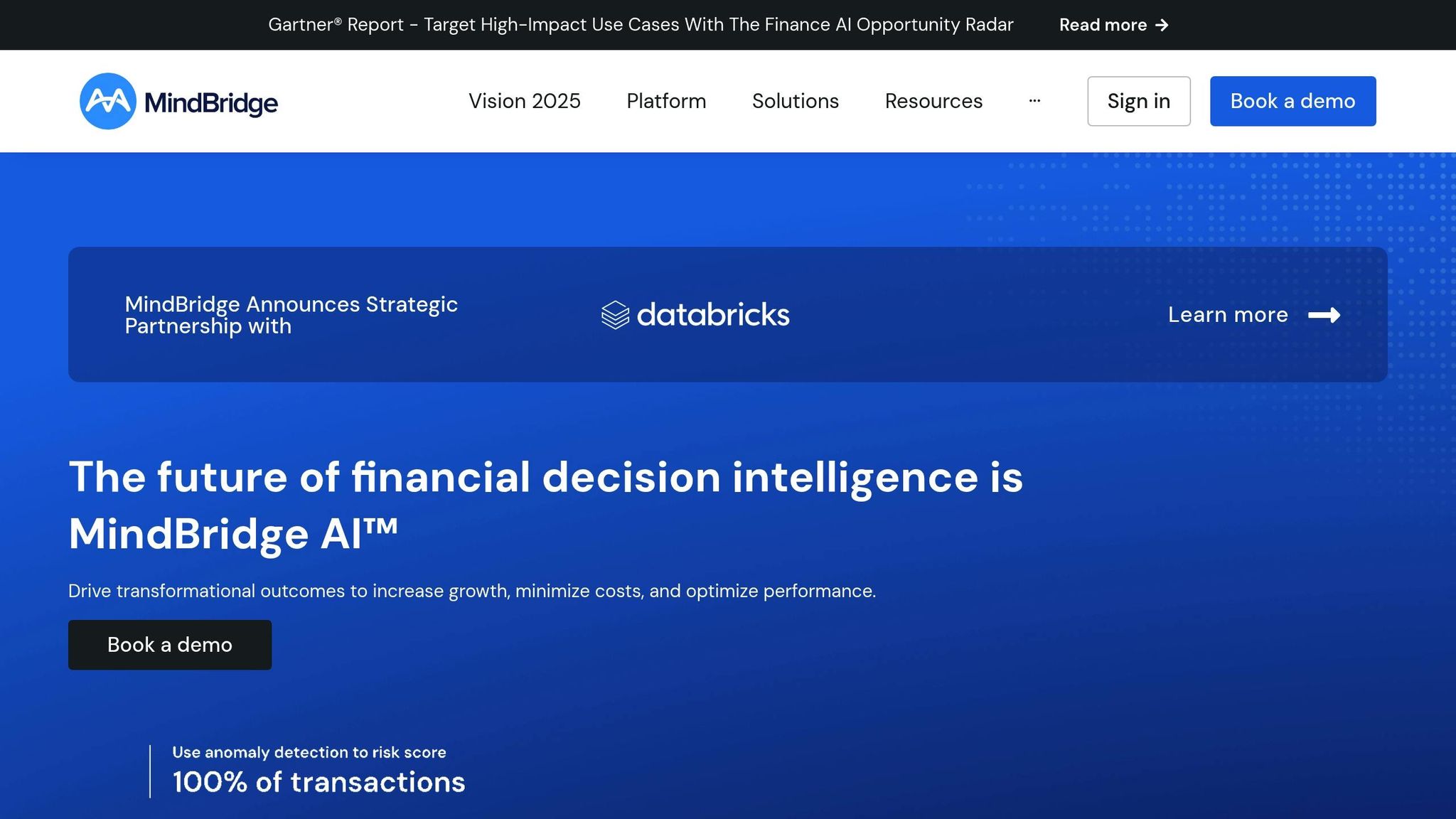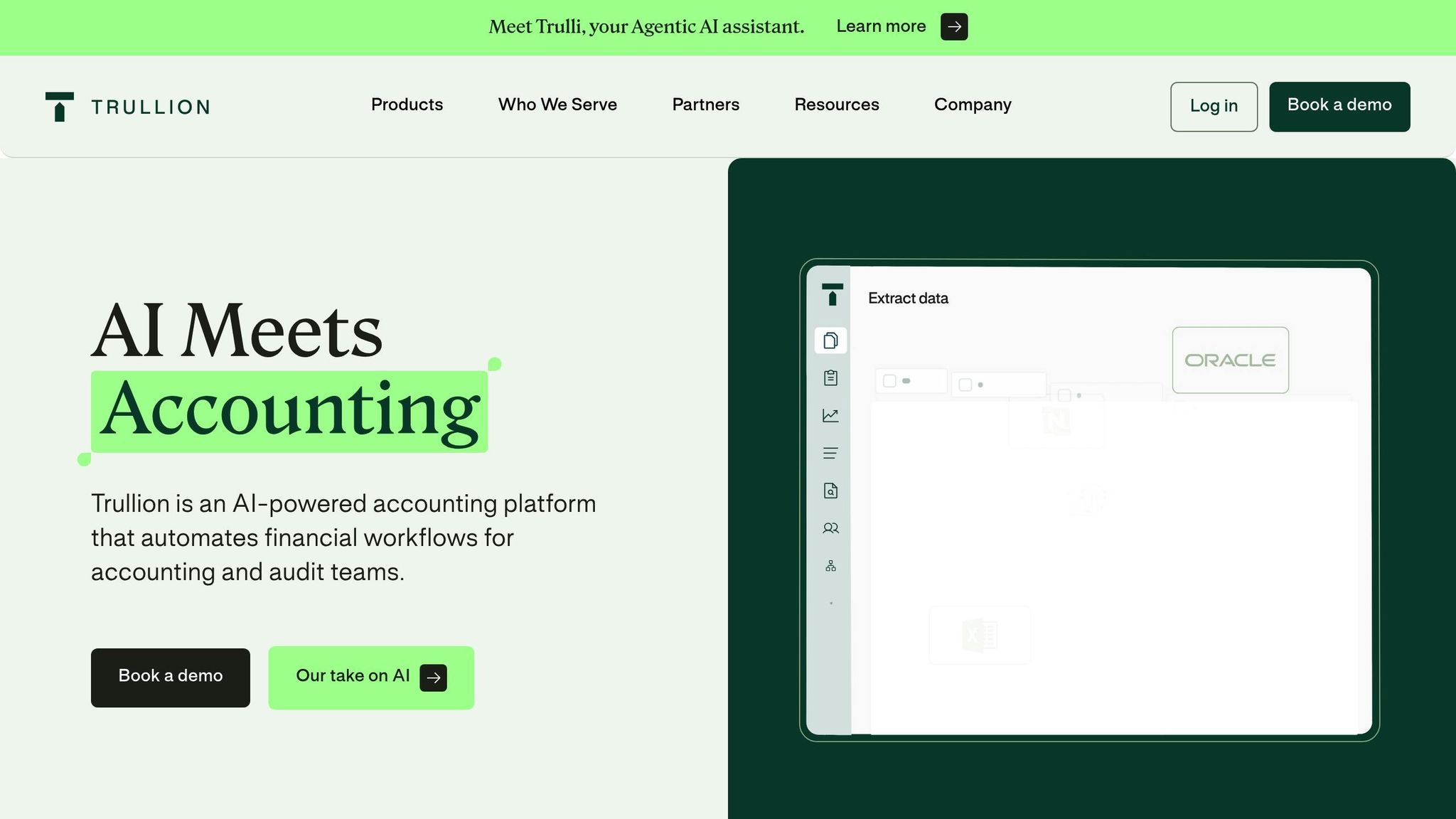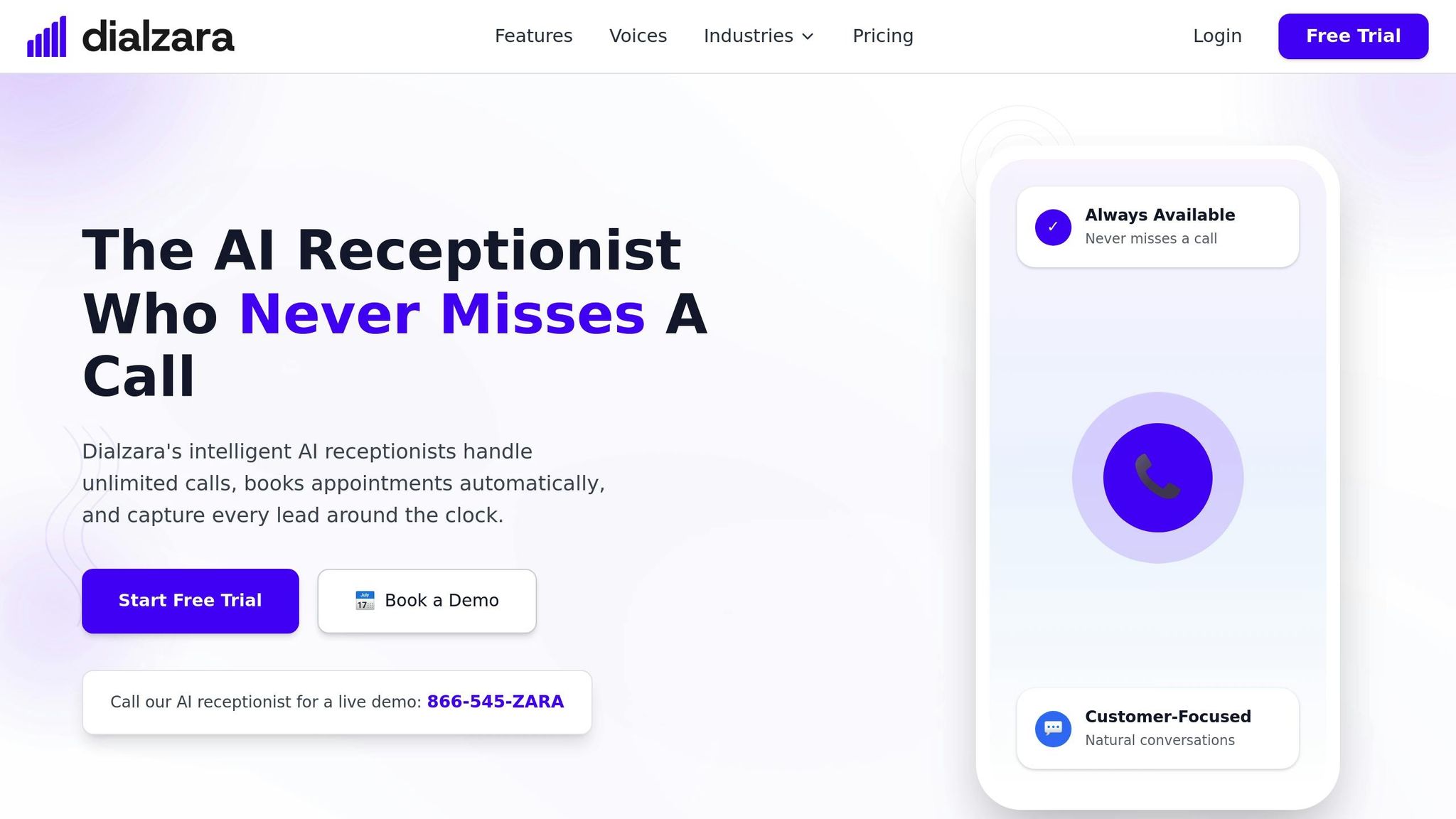
Best AI Compliance Monitoring Platforms for Financial Services in 2025
Cut compliance costs by 40% and reduce false alerts by 95% with AI tools built for complex regulatory environments.

Written by
Adam Stewart
Key Points
- Save up to 40% on compliance costs with automated monitoring systems
- Reduce false positives from 95% to under 10% using smart AI filtering
- Meet 2025 DORA Act requirements with real-time document recognition
- Connect AI platforms directly to Excel and existing ERP workflows
Regulatory complexity keeps growing, penalties keep climbing, and compliance teams keep drowning in false positives. Financial institutions spend $61 billion annually on compliance operations, yet 95% of transaction monitoring alerts turn out to be nothing. If you're searching for the best AI compliance monitoring platforms for financial services, you're not alone - and the right choice can cut costs by up to 40% while helping your team focus on genuine risks.
This guide examines five leading AI compliance tools that are changing how banks, insurance companies, and financial advisors handle regulatory requirements. Whether you need automated audit trails, GAAP revenue compliance automation, or real-time risk detection, we'll help you find the platform that fits your specific needs and budget.
Why Financial Services Need AI Compliance Monitoring in 2025
The regulatory landscape has shifted. The Financial Stability Oversight Council (FSOC) elevated AI as a major focus area in its December 2024 Annual Report, identifying increased AI reliance as both an opportunity and a mounting risk requiring enhanced oversight.
Meanwhile, the EU's Digital Operational Resilience Act (DORA) took effect in January 2025, mandating that financial entities strengthen their resilience against technology-related disruptions. For U.S. firms with European operations, this adds another layer of compliance complexity.
The numbers tell the story clearly:
- Over 85% of financial firms now actively apply AI in fraud detection, IT operations, and risk modeling
- AI spending in financial services is projected to reach $97 billion by 2027
- The U.S. Treasury prevented and recovered $4 billion in fraud in FY2024 using AI (up from $652.7 million in FY2023)
- Financial services firms see 40% cost reductions when implementing AI in compliance and settlement
With these stakes, choosing the right AI compliance platform isn't just about efficiency. It's about survival in an increasingly regulated market.
sbb-itb-ef0082b
Quick Comparison: Best AI Compliance Monitoring Platforms for Financial Services
| Tool | Primary Focus | Key Features | Pricing | Best For |
|---|---|---|---|---|
| DataSnipper | Audit Documentation | Document matching, SOX compliance, audit trails | $30-$50/user/month | Audit and accounting firms |
| Workiva | Regulatory Reporting | Real-time collaboration, SEC filings, ESG reporting | $50,000+/year | Large enterprises, public companies |
| MindBridge | Risk Detection | Anomaly detection, fraud scoring, explainable AI | Custom pricing | Banks, financial institutions |
| Trullion | Accounting Standards | ASC 842, ASC 606, IFRS 16 compliance | Tiered pricing | Real estate, finance companies |
| Dialzara | Client Communication | Call tracking, encryption, compliance documentation | Subscription-based | SMBs, financial services firms |
1. DataSnipper: Top AI Document Recognition Tools for Compliance and Audit Trails

DataSnipper has become a go-to solution for over 500,000 auditors and accountants worldwide who need reliable document recognition and audit trail capabilities. The platform works directly within Microsoft Excel, which means your team can automate compliance tasks without learning an entirely new system.
Compliance Automation Features
DataSnipper's AI matches supporting documents with transactions automatically, extracts critical data from financial documents, and flags irregularities before they become problems. The platform excels at SOX (Sarbanes-Oxley) compliance, automating evidence collection and generating detailed audit trails that satisfy regulatory requirements.
Real results from actual users paint a clear picture:
- A mid-sized U.S. accounting firm reduced SOX audit preparation time by 40%
- Users report up to 70% reduction in time spent on audit documentation
- One financial services company cut compliance-related labor hours by 30%
Beyond SOX, DataSnipper supports Dodd-Frank and SEC regulations, offering flexibility for various financial operations. Its explainable AI addresses the "black box" concerns that often make regulators nervous about automated systems.
Pricing and Integration
Subscription plans start at $30-$50 per user per month, with enterprise packages available for larger teams. Annual contract discounts help with budget planning. The platform connects with popular ERP systems and document management tools, with deployment typically completed within a few days.
Who Should Use DataSnipper
This platform fits best for accounting firms, audit teams, and financial services organizations that prioritize efficient audit processes. Industries like banking, insurance, and asset management benefit most from its document-centric approach to compliance.
2. Workiva: Leading AI Platform for Enterprise Regulatory Reporting
Workiva earned recognition in the 2024 Gartner Magic Quadrant for good reason. This cloud-based platform handles the heavy lifting of regulatory reporting for complex financial compliance needs, particularly for publicly traded companies dealing with SEC requirements.
Compliance Automation Features
The platform's strength lies in real-time collaboration on compliance documents. Multiple stakeholders can work on filings and audit documentation simultaneously, which speeds up the reporting process considerably.
Workiva automates regulatory reporting for SOX, SEC, ESG, and Dodd-Frank requirements. Its AI-powered monitoring offers predictive analytics and automated alerts when U.S. financial laws change, helping organizations adjust workflows before deadlines hit.
One U.S. bank reported a 40% reduction in reporting time after implementing Workiva. The platform's detailed audit trails promote transparency, which builds trust with both regulators and stakeholders.
Pricing and Integration
Workiva uses flexible pricing that adjusts based on organization size, user count, and selected modules. Expect starting costs around $50,000 per year for mid-sized businesses, with larger enterprises paying more for additional integrations and advanced analytics.
The platform integrates with ERPs, CRMs, and data warehouses through APIs and pre-built connectors. This ensures smooth data flow without major system overhauls.
Who Should Use Workiva
Public companies managing SEC reporting, large enterprises with complex multi-framework compliance needs, and organizations requiring extensive collaboration on regulatory filings will get the most value from Workiva.
3. MindBridge: Top AI Tools for Risk Detection and Anomaly Analysis

MindBridge takes a different approach from DataSnipper and Workiva by focusing on real-time anomaly detection and risk scoring. Rather than just documenting compliance, it actively hunts for problems before they escalate into major issues.
Compliance Automation Features
The platform uses explainable AI and machine learning to analyze historical data, predict compliance trends, and generate clear audit trails. What sets MindBridge apart is its risk scoring system. When it flags an anomaly, it assigns a priority score so compliance teams know exactly where to focus their attention.
MindBridge can process millions of transactions in real time using advanced tools like Graph Neural Networks. It also uses natural language processing to track regulatory updates and market sentiment, helping businesses adjust risk strategies as rules evolve.
The results speak for themselves:
- Audit time reduced by up to 30%
- Detection of material misstatements improved by as much as 40%
- Compliance teams can focus on genuine risks rather than false positives
Pricing and Integration
MindBridge uses custom pricing based on organization size, transaction volume, and user count. Contact their team directly for quotes. The platform works with existing financial systems including ERP software without requiring major IT overhauls.
Who Should Use MindBridge
Mid-sized and large financial institutions facing complex compliance challenges benefit most from MindBridge. Banks, insurance companies, and asset management firms dealing with strict regulatory frameworks like Dodd-Frank and GDPR will find its risk detection capabilities particularly valuable.
4. Trullion: Top AI Services for GAAP Revenue Compliance Automation

Trullion specializes in automating compliance for complex accounting standards like ASC 842, ASC 606, and IFRS 16. If your organization struggles with lease accounting or revenue recognition requirements, this platform addresses those specific pain points.
Compliance Automation Features
Trullion's AI engine processes unstructured data from PDFs, emails, and scanned documents, automatically aligning them with relevant accounting standards. It goes beyond simple data extraction to automate calculations for regulatory reporting and create real-time audit trails.
The platform stays ahead of regulatory updates by providing automated alerts and guidance. This is especially important as U.S. GAAP standards continue to evolve. For organizations dealing with ASC 606 revenue recognition requirements, Trullion automates compliance calculations that would otherwise require extensive manual work.
Real-world results demonstrate the platform's impact:
- A U.S.-based REIT cut manual data entry by 75% for ASC 842 lease accounting
- Audit preparation time dropped from three weeks to four days
- A U.S. insurance company saw compliance reporting time decrease by 50%
- Audit error rates fell to under 1%
Pricing and Integration
Trullion uses tiered pricing based on user count, contract volume, and integration requirements. The platform integrates with QuickBooks, NetSuite, SAP, and Oracle, along with API connections to document management systems. SOC 2 Type II certification ensures data security standards meet U.S. requirements.
Who Should Use Trullion
Accounting firms, banks, insurance companies, and real estate businesses needing reliable lease accounting and revenue recognition solutions will benefit most. Trullion serves over 1,000 organizations worldwide, including Fortune 500 companies and top audit firms.
5. Dialzara: Top AI Platform for Client Communication and Documentation

While the previous platforms focus on document processing and risk detection, Dialzara addresses a different compliance challenge: ensuring all client communications are properly documented and follow regulatory guidelines. This AI-powered virtual phone answering service helps financial businesses maintain compliance during every customer interaction.
Compliance Automation Features
Dialzara's AI agent tracks calls, messages, and actions while handling multi-step verifications and escalating calls when necessary. This creates detailed audit trails that align with SEC and FINRA requirements for client communication documentation.
The system can be customized to follow specific regulatory scripts, ensuring consistent compliance across all client interactions. When dealing with sensitive financial inquiries, the AI agent flags and escalates calls to human compliance officers if it detects anything unusual. For example, if a caller requests confidential account information, the system automatically initiates extra authentication steps or transfers the call to authorized personnel.
All interactions are encrypted and securely stored, with flexible data retention policies and access controls that comply with U.S. privacy regulations. This automated approach reduces the risk of human error in call handling while providing the transparency regulators require.
Pricing and Integration
Dialzara operates on a subscription-based model that can cut communication costs by up to 90% compared to traditional staffing. The platform connects with over 5,000 business applications, including CRM and compliance management systems.
When a client calls about an account change, the system can update their CRM record, log the call for compliance, and trigger follow-up actions automatically. Setup takes minutes rather than weeks, requiring just account creation, basic business training questions, voice selection, and call forwarding configuration.
Who Should Use Dialzara
Banking, insurance, investment advisory, and accounting firms seeking automated client intake and call screening will find Dialzara particularly useful. The platform adapts quickly to industry-specific terminology, making it well-suited for financial services firms that need compliant client communication without the overhead of additional staff.
AI Hardware Considerations: AI PC Ranges for Finance-Specific Workloads
Running AI compliance monitoring platforms effectively requires appropriate hardware infrastructure. While cloud-based solutions handle most processing, organizations running on-premises compliance tools or processing sensitive data locally need to consider their hardware requirements.
Hardware Requirements by Platform Type
Cloud-based platforms like Workiva and Dialzara require minimal local hardware since processing happens on their servers. Standard business computers with reliable internet connections work fine for these solutions.
However, organizations using MindBridge for real-time anomaly detection across millions of transactions may benefit from workstations with:
- 16GB+ RAM for handling large datasets
- SSD storage for faster data access
- Modern multi-core processors for parallel processing
- Dedicated graphics cards if running local machine learning models
For firms processing highly sensitive data that cannot leave their premises, dedicated AI workstations with GPU acceleration can speed up compliance analysis. These typically range from $2,000 to $10,000 depending on specifications.
Cost-Benefit Analysis
Most small to mid-sized financial services firms will find cloud-based compliance platforms more cost-effective than investing in specialized hardware. The subscription costs of platforms like Dialzara or DataSnipper are far lower than purchasing and maintaining dedicated AI infrastructure.
Large institutions processing massive transaction volumes may justify hardware investments, but should factor in ongoing maintenance, security updates, and IT staff costs when comparing options.
AI Compliance Tools Cost Savings and Revenue Growth: Measuring ROI
Understanding the financial impact of AI compliance platforms helps justify the investment and choose the right solution for your budget.
Direct Cost Savings
AI compliance platforms deliver measurable cost reductions across several areas:
- Labor costs: Financial services firms see 40% cost reductions when implementing AI in compliance and settlement operations
- Audit efficiency: Platforms like DataSnipper report 70% reduction in audit effort, translating to major staff time savings
- False positive reduction: AI platforms can achieve 95%+ true risk detection, cutting time spent investigating false alarms
- Penalty avoidance: With U.S. regulators issuing $4.3 billion in penalties in 2024, avoiding even one major fine can pay for years of compliance software
Revenue Protection
Beyond cost savings, AI compliance tools protect revenue by:
- Catching fraud earlier (Mastercard's AI improved fraud detection by 20% on average, up to 300% in specific cases)
- Reducing compliance-related business disruptions
- Maintaining customer trust through consistent regulatory adherence
- Enabling faster response to regulatory changes that could impact operations
ROI Calculation Example
Consider a mid-sized financial services firm spending $500,000 annually on compliance labor. Implementing an AI platform that reduces effort by 40% saves $200,000 per year. Even with a $50,000 annual platform cost, the net savings of $150,000 represents a 300% ROI in the first year.
For smaller firms, platforms like Dialzara offer even more dramatic returns. At subscription costs under $200 per month, the savings compared to hiring compliance-trained staff for client communication can exceed 90%.
How to Choose the Best AI Compliance Monitoring Platforms for Financial Services
Selecting the right platform depends on your specific compliance challenges, organization size, and budget constraints.
By Primary Compliance Need
- Audit documentation and SOX compliance: DataSnipper offers the best balance of features and affordability
- SEC and multi-framework reporting: Workiva provides the most comprehensive enterprise solution
- Fraud detection and risk scoring: MindBridge excels at anomaly detection and predictive risk analysis
- GAAP revenue recognition and lease accounting: Trullion specializes in ASC 606 and ASC 842 compliance
- Client communication compliance: Dialzara handles call documentation and regulatory script adherence
By Organization Size
- Small businesses and startups: Dialzara and DataSnipper offer affordable entry points with quick deployment
- Mid-sized firms: MindBridge and Trullion provide specialized capabilities without enterprise-level pricing
- Large enterprises: Workiva delivers the comprehensive reporting and collaboration features needed for complex organizations
By Deployment Speed
- Immediate (minutes to hours): Dialzara deploys fastest with minimal configuration required
- Days to weeks: DataSnipper and Trullion require moderate setup and training
- Weeks to months: Workiva and MindBridge need more extensive implementation for full functionality
Regulatory Framework Support Comparison
Different platforms support different regulatory requirements. Here's what each tool covers:
- Workiva: SOX, SEC, Dodd-Frank, GDPR, ESG reporting frameworks
- DataSnipper: SOX, IFRS, GAAP, Dodd-Frank, SEC regulations
- MindBridge: SOX, general audit compliance, AML requirements
- Trullion: ASC 842, ASC 606, IFRS 16, GAAP revenue recognition
- Dialzara: SEC and FINRA communication requirements, privacy and data-handling standards
For organizations dealing with multiple regulatory frameworks, Workiva offers the broadest coverage. Firms with specific accounting standard requirements should prioritize Trullion. Those focused primarily on audit efficiency will find DataSnipper most aligned with their needs.
Implementation Best Practices for AI Compliance Platforms
Getting maximum value from your AI compliance investment requires thoughtful implementation.
Start with Clear Objectives
Define exactly which compliance challenges you're trying to solve before selecting a platform. Are you drowning in audit documentation? Struggling with false positives in risk monitoring? Missing client communication records? The answer shapes which tool fits best.
Plan for Integration
Map out how the new platform will connect with your existing systems. Dialzara's 5,000+ application integrations provide flexibility, while Workiva's enterprise connectors suit organizations with established ERP systems. Platforms like Trullion work best when connected directly to your accounting software.
Invest in Training
Even user-friendly platforms require staff training to maximize effectiveness. Budget time for your team to learn the system's capabilities and establish consistent workflows. Proper training and governance ensures your compliance processes remain consistent.
Monitor and Adjust
AI compliance platforms improve over time as they learn your organization's patterns. Review performance metrics regularly and adjust configurations based on results. Most platforms offer analytics dashboards that highlight areas for optimization.
The Future of AI Compliance Monitoring in Financial Services
The compliance landscape continues to evolve rapidly. By the end of 2025, fully capable agentic AI copilots are being launched to support investigators across sanction screening, AML, and KYC processes. These next-generation assistants will allow compliance teams to interact through natural language, retrieving relevant data and providing contextual insights on demand.
The Financial Action Task Force (FATF) now recommends integrating AI tools into AML programs to automate risk assessment. Organizations that adopt AI compliance platforms today will be better positioned to meet these evolving requirements.
As one industry expert noted: "For compliance leaders, the challenge is no longer meeting minimum standards, but building operating models that can adapt as quickly as the risks themselves. Success will come from treating compliance as a strategic capability."
Selecting the Best AI Compliance Monitoring Platforms for Financial Services
AI compliance tools have become essential for financial institutions managing risk and regulatory requirements. With U.S. regulators issuing $4.3 billion in penalties in 2024 alone, the cost of non-compliance far exceeds the investment in solid AI-driven solutions.
For organizations seeking the best AI compliance monitoring platforms for financial services, the choice depends on your specific needs:
- Choose DataSnipper for efficient audit documentation and SOX compliance at reasonable per-user pricing
- Choose Workiva for comprehensive enterprise reporting across multiple regulatory frameworks
- Choose MindBridge for advanced risk detection and anomaly analysis in complex financial environments
- Choose Trullion for specialized GAAP revenue compliance automation and lease accounting
- Choose Dialzara for compliant client communication documentation with rapid deployment and major cost savings
The financial industry is moving fast, with 85% of organizations already using AI for compliance. Start by identifying your most urgent compliance challenges and match them with the strengths of available tools. Your compliance strategy should grow with your business, so look for platforms that scale, offer clear pricing, and provide the explainability regulators increasingly require.
Ready to simplify your compliance operations? Explore Dialzara's pricing plans to see how AI-powered client communication can reduce costs while maintaining regulatory compliance. For questions about implementation, contact our team to discuss your specific requirements.
FAQs
How can AI tools help financial businesses stay compliant with data regulations?
AI tools transform how financial businesses handle data compliance by automating complex tasks, improving accuracy, and reducing human error. These platforms can analyze massive datasets, detect irregularities, and help companies meet regulatory standards more efficiently.
Take Dialzara as an example. This AI-driven virtual phone answering service integrates into financial workflows, managing tasks like answering calls, relaying messages, and scheduling appointments while adhering to industry-specific compliance standards. By automating these activities, businesses save time, cut costs, and deliver consistent service to clients. Learn more about AI benefits for financial planning.
What should I consider when selecting an AI tool for financial data compliance?
When selecting an AI tool for financial data compliance, focus on several key factors. Accuracy and reliability should top your list since the tool will handle sensitive financial information and navigate complex regulations. Features like real-time monitoring, automated reporting, and compliance tracking make a real difference in maintaining accuracy.
Integration capabilities matter equally. The tool should work with your current systems, such as accounting software or CRM platforms, to simplify workflows. This compatibility saves time and reduces errors from manual data transfers. Also consider cost-effectiveness by evaluating pricing models, scalability, and how costs compare to manual compliance processes.
Finally, data security measures protect your business and customer information. Look for encryption, strict access controls, and regular security updates to keep data safe.
Why are integration capabilities important for AI tools in financial data compliance?
Integration capabilities ensure AI compliance tools fit smoothly into your existing financial systems. When tools connect properly, businesses can automate compliance tasks without disrupting workflows or investing in expensive system overhauls.
AI tools with strong integration options link with CRMs, accounting software, and data management systems. This enables accurate data sharing and real-time updates, boosting efficiency while minimizing errors. Dialzara's connection to over 5,000 business applications demonstrates how broad integration support simplifies compliance management. For more on navigating AI regulations, see our comprehensive guide.
How do AI compliance platforms handle regulatory changes?
Leading AI compliance platforms monitor regulatory updates automatically and adjust their processes accordingly. Workiva and Trullion provide automated alerts when relevant regulations change, giving compliance teams time to adapt workflows before deadlines.
MindBridge uses natural language processing to track regulatory updates and market sentiment, helping businesses adjust risk strategies proactively. This automated monitoring is especially valuable given the pace of regulatory change in financial services.
What is the typical ROI timeline for AI compliance platforms?
Most organizations see positive ROI within 6 to 12 months of implementing AI compliance platforms. Faster-deploying solutions like Dialzara can show returns within weeks through immediate labor cost reductions. Enterprise platforms like Workiva may take longer to implement but deliver substantial returns once fully operational.
The 40% cost reduction commonly reported in compliance and settlement operations translates to major savings even in the first year. Combined with penalty avoidance and improved audit efficiency, most financial services firms recover their investment quickly.
External References
Summarize with AI
Related Posts
AI in Financial Planning: Benefits for SMBs
Explore how AI tools transform financial planning for SMBs, enhancing efficiency, reducing costs, and providing real-time insights for smarter decisions.
Top 5 AI Tools for Credit Card Fraud Detection
Explore five leading AI tools that enhance credit card fraud detection, improving accuracy while minimizing false positives and customer frustration.
AI Compliance Automation: 2024 Guide
Explore the benefits, technologies, use cases, and best practices of AI compliance automation in this comprehensive guide. Learn how AI is transforming regulatory compliance.
AI for HR Compliance: Monitoring & Reporting
Discover how AI can streamline HR compliance through monitoring, reporting, and training. Learn the steps to implement AI in compliance processes.
